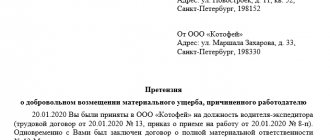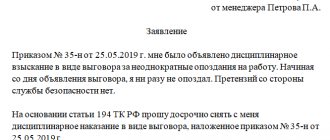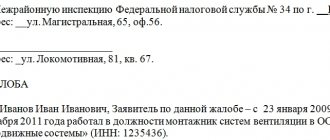Labor discipline is established in the company taking into account the Labor Code and internal labor regulations. By signing the job description and other documents when applying for a job, the employee makes it clear to the employer that he understands his job responsibilities and is ready to comply with the accepted routine.
Thus, according to Letter of the Ministry of Labor of the Russian Federation dated September 16, 2016 N 14-2/B-888, internal labor regulations, local regulations or an employment contract may contain provisions stipulating the inadmissibility of rude, harsh expressions when communicating with colleagues or clients. This means that the employer may take disciplinary action against an employee who violates these provisions.
General provisions on disciplinary action
The articles of the Labor Code establish that the administration can carry out disciplinary sanctions against its employees in the following form:
- Remarks - established for minor employee misconduct and failure to fulfill duties.
- Reprimand - it can last for one month, after which it is removed. It is important to remember that the concept of a strict reprimand does not exist.
- Dismissals are established for serious offenses.
Establishing disciplinary liability requires studying the materials of the misconduct and recording all the facts in paper form that determine the guilt of the employee. The procedure should begin with obtaining an explanation from the perpetrator.
When management decides on the choice of punishment, they must take into account the severity of the misconduct of the guilty employee, as well as the circumstances that accompanied the violation.
Legislation, as well as the enterprise's Regulations on Penalty, may provide for other penalties not prohibited by the code for certain categories of employees. However, the use of such measures as a fine or deprivation of bonuses is unlawful.
Attention! An important point when establishing a disciplinary sanction is that its basis is an order of the head of the company, signed by the director.
If the employee believes that he was subjected to this responsibility unfairly, they will appeal the disciplinary action.
For these purposes, he can draw up and submit an application to the following authorities:
- Labor Dispute Commission.
- State Labor Inspectorate.
- To court.
Attention! An offended employee can apply to the judicial authorities immediately as soon as he decides that his rights have been violated, or he can try to restore his rights pre-trial through a commission or labor inspectorate.
conclusions
So, in any case, the employee has the right to challenge the disciplinary sanction and appeal it in the manner prescribed by law.
This right is enshrined in the Labor Code (Article 193 of the Labor Code of the Russian Federation). It is important to note that only a properly completed application and other documents will help speed up the appeal process.
It is also extremely important to ensure that each copy of the application bears the signature of the director, otherwise the documents will not have legal force.
It is recommended to start appealing a reprimand if the employee is firmly convinced that he is right, and also has a good reason or other compelling arguments. Otherwise, the committee’s decision may not be at all in favor of the employee, and this may be followed by dismissal, according to Article 81 of the Labor Code of the Russian Federation.
It is worth noting that this type of disciplinary sanction, as a rule, does not have significant consequences for the employee, and also loses its legal force after a specified period. Therefore, in practice, appealing a reprimand does not happen very often.
Grounds for appealing a collection order
Challenging a disciplinary sanction requires mandatory clarification of the grounds in order to challenge the order. After all, only indicating the reasons for the appeal will allow the penalties imposed on the employee to be reviewed.
There are the following grounds on which an established disciplinary sanction may be appealed:
- Procedural - that is, in the process of bringing the employee to disciplinary liability, the procedure for imposing penalties on him was violated. Thus, the release from liability is not because he is not guilty, but because of a violation of the procedure, which includes obtaining an explanation of what happened from the offender (2 days), issuing an order to hold him accountable, and drawing up an act on the employee’s refusal to sign the order. It is important to remember that any failure to follow the procedure may be grounds for a challenge.
- Material - when the employee considers himself completely not guilty, and the imposition of a penalty is illegal. In this case, these grounds depend entirely on the circumstances of the case.
Can I challenge it at work?
In response to unreasonable actions, the employee has the legal right to appeal the employer’s disciplinary reprimand.
It is also worth considering that a reprimand has no legal force if the employee does not provide a written explanation (the exception is the employee’s refusal to provide written explanations).
At least two days are given to write an explanatory note, which means that preparing the necessary documents for issuing a reprimand also lasts about two days.
You can also challenge a disciplinary sanction for a violation that was committed later than six months, since a certain period is also set for issuing a reprimand.
Disciplinary action may not be appropriate in some situations. For example, being late for work by just a few minutes. In this case, the employee has the right to challenge the reprimand, since its use is not justified in this situation.
Another compelling argument for appealing a reprimand can be a situation where a violation of labor discipline or duties occurred for reasons that were not dependent on the employee, and he could not influence the course of events in any way. This applies to car accidents, emergencies and some other life circumstances.
In order to challenge the punishment, the employee will have to indicate in the explanatory note the presence of documents that can confirm his innocence.
How to prove your innocence?
In a situation where a punished employee does not agree with the charges brought against him, he, according to the norms, can defend his innocence. For this purpose, the employee is recommended to draw up an explanatory note addressed to management.
This document describes in detail the current situation and provides all the facts confirming his innocence. If the employee can confirm the absence of his guilt with the help of witnesses, then he can involve their testimony and explanations.
If management ignores the document submitted by the employee, he can turn to the competent authorities to protect his rights. To do this, he simply chooses a way to challenge the disciplinary sanction imposed on him.
You might be interested in:
Salary is delayed, what should an employee do, where to complain, employer’s responsibility
Form and deadlines for filing an appeal
Russian legislation establishes the time limits for employees to appeal disciplinary sanctions imposed against them, as well as the procedure for drawing up an application.
Recommended written form
A complaint about a disciplinary sanction must be submitted only in writing. It is recommended that the authority that will review it provide two copies - one will remain in place, and the second will be marked with receipt.
It is advisable to formulate a complaint in the following format:
- Name of the body to which the complaint is sent;
- Information about the applicant - his full name, residential address, contact information;
- Title of appeal;
- Information about the employer - its name, registration codes (if any), information about officials;
- A detailed description of the violation committed;
- Result of the appeal (cancel the order, pay compensation, punish the employer, etc.);
- If necessary, a request to conduct an inspection without disclosing information about the applicant;
- Date and signature;
- List of attached documents.
Attention! The complaint must always contain information about the citizen who is filing it. The law prohibits the consideration of anonymous appeals. If an employee does not want information about him to become known to the employer, he must indicate this in the text of the application.
Period for pre-trial appeal of a disciplinary sanction
You can file a complaint with the labor inspectorate or the Labor Disputes Committee within 3 months from the date of the violation of rights, or within 1 month from the date of dismissal (if it was the result of a disciplinary sanction).
If the statute of limitations has been missed due to a valid reason, then it is necessary to file an appeal to the Committee and attach supporting documents. The circumstances of the omission will be reviewed, and if the outcome is positive, the period will be restored.
Time limit for appealing a disciplinary order in court
Appealing a disciplinary sanction through court is subject to the same deadlines as other claims in labor disputes.
A claim must be filed with the court within 3 months from the date of violation of rights. If an employee was dismissed as a result of a disciplinary sanction, the claim must be filed within 1 month.
An employee may miss the deadline for appealing a disciplinary sanction in court for a good reason (for example, he was in the hospital). In this case, he must provide the court with documents that would confirm this reason.
Attention! If the court considers this to be justified, it will reinstate the deadline for filing the application.
Company fines for violating employee rights
For incorrect application of a disciplinary sanction, the employer will receive a warning from the labor inspectorate or an administrative fine (Part 1 of Article 5.27 of the Code of Administrative Offenses of the Russian Federation):
- for an accountant, director or personnel officer - from 1,000 to 5,000 rubles;
- for an organization - from 30,000 to 50,000 rubles.
In case of repeated violation, the fines are increased (Part 2 of Article 5.27 of the Code of Administrative Offenses of the Russian Federation):
- for officials - from 10,000 to 20,000 rubles fine or disqualification for 1-3 years;
- for organizations - from 50,000 to 70,000 rubles.
Maintain personnel, accounting and tax records in the Kontur.Accounting web service. The system is suitable for small businesses and contains all the tools an accountant needs. The first two weeks of work are free for all newbies.
Where can I appeal a disciplinary sanction?
You can appeal a disciplinary sanction to the labor inspectorate, the labor dispute committee, and, last but not least, to the court.
How to appeal a penalty to the Labor Inspectorate
A complaint against an employer can be filed either in paper form or via the Internet using the Onlineinspektsiya.RF website.
The appeal is made in free form. It must contain the name of the inspection where the document is sent, information about yourself and the employer. Next, the text of the form must state the circumstances of the violation that occurred.
A paper complaint can be brought in person to the government agency, or sent by registered mail with notification.
Based on its results, an audit should be carried out. If the outcome of the case is positive, the inspector will issue an order to cancel the disciplinary punishment.
Appeal by appealing to the Labor Disputes Committee
An appeal against a penalty can be made by contacting the Labor Disputes Committee. It is vested with the authority to consider individual complaints from employees and can be formed, among other things, at the request of employees. Most often, committees operate in those companies where a trade union has been formed.
The application to the Committee is drawn up in free form, which details the circumstances of the event. It is best to make an application in two copies, one will be submitted for consideration, and the second should be marked with receipt.
The application must be reviewed within 10 days from the date of receipt of the application. On the day of consideration of the dispute at the meeting, the employee must be present in person, send his representative, or fill out an application with a request to consider the dispute without the applicant.
Important! You can appeal the Committee's decision in court within 10 days.
Judicial authorities
You can file a claim in court both at the location of the employer and at the place of residence of the employee or actual place of work.
You might be interested in:
An employment contract with an employee: what it should contain, the procedure for concluding, a standard form
In a statement of claim to appeal a reprimand or other punishment in court, it is necessary to indicate the circumstances of the violation, indicate the price of the claim (if demanding compensation for moral damage, etc.), and attach supporting documents.
When filing a claim regarding a labor dispute, the employee is exempt from paying state duty.
The applicant or his authorized representative must be present at the trial in person. If the employee or employer has justifiable reasons, the consideration of the case may be suspended and postponed to another time.
Based on the results of the trial, each party will be given a decision.
Important! You can file an appeal against a court decision within 1 month from the date of its delivery.
Verification upon application
Based on the results of submitting an application to the labor inspectorate, it will have to conduct an extraordinary inspection. According to general rules, when conducting an inspection, the government agency must notify the company at least 24 hours before it begins.
But in the case when a statement was filed about a violation of an employee’s labor rights, or about any violations committed that pose a threat to the life and health of workers, an inspection is carried out immediately. The employer is not notified.
When appearing at the enterprise, the inspector must present a certificate and an order to conduct an inspection. If it is carried out due to a complaint, the inspector must check only the information specified in the complaint.
The employer may be asked to provide documents that relate to the work activities of the employee who filed the complaint. The inspector cannot request other documents and information that is not related to the purpose of the event.
If during the inspection process any facts are revealed that indicate the presence of other violations, then after the completion of the current visit, a new unscheduled inspection may be initiated.
Attention! Based on the results of the inspection, a report is drawn up listing the violations found. An order is also issued with measures to eliminate violations that the organization is obliged to fulfill.
The inspector is also authorized to issue an administrative fine in accordance with the Code of Administrative Offenses.
Remark and reprimand
The Labor Code does not prescribe the differences between a reprimand and a reprimand, but simply provides a list of disciplinary actions from the easiest to the most serious - dismissal. The employer can outline the difference between these two measures in a local regulation and establish the grounds for their use.
Each measure must correspond to the severity of the offense and take into account the situation and circumstances of the violation (Article 192.5 of the Labor Code of the Russian Federation). The law also requires taking into account the behavior of the employee before the violation of discipline and his attitude towards work (Resolution of the Plenum of the Supreme Court of the Russian Federation of March 17, 2004 No. 2).
In practice, HR officers and directors more often use a reprimand than a reprimand. Both of these measures should draw the employee's attention to his misconduct and increase responsibility.
A local regulatory act can also provide for deprivation of a bonus or a proportionate reduction in incentive payment for violation of discipline (appeal ruling of the Supreme Court of the Republic of Tatarstan dated September 26, 2013 in case No. 33-11761/2013).
Disciplinary offenses are also specified in the Resolution of the Plenum of the Supreme Court of the Russian Federation dated March 17, 2004 N 2, for example:
- Employee absence from work. If the employment contract or local act of the company does not describe the specific workplace of the employee, be guided by the definition given by the Labor Code of the Russian Federation in Art. 209.6: this is the place where the employee is located and where he arrives to perform work and which the employer controls directly or indirectly.
- Refusal of special training or medical examination, passing examinations on labor protection, operating rules and safety regulations. This applies to employees who are allowed to work only after completing these processes.
Keep records of exports and imports in the Kontur.Accounting web service. Simple accounting, payroll and reporting in one service








